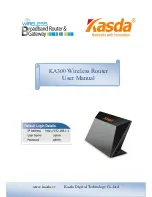
Troubleshooting
49
Federal Communication Commission Interference Statement
This equipment has been tested and found to comply with the limits for a Class B
digital device, pursuant to Part 15 of the FCC Rules. These limits are designed to
provide reasonable protection against harmful interference in a residential
installation. This equipment generates, uses and can radiate radio frequency
energy and, if not installed and used in accordance with the instructions, may cause
harmful interference to radio communications. However, there is no guarantee that
interference will not occur in a particular installation. If this equipment does cause
harmful interference to radio or television reception, which can be determined by
turning the equipment off and on, the user is encouraged to try to correct the
interference by one of the following measures:
-
Reorient or relocate the receiving antenna.
-
Increase the separation between the equipment and receiver.
-
Connect the equipment into an outlet on a circuit different from that
to which the receiver is connected.
-
Consult the dealer or an experienced radio/TV technician for help.
FCC Caution: Any changes or modifications not expressly approved by the party
responsible for compliance could void the user's authority to operate this equipment.
This device complies with Part 15 of the FCC Rules. Operation is subject to the following
two conditions: (1) This device may not cause harmful interference, and (2) this device
must accept any interference received, including interference that may cause undesired
operation.
IMPORTANT NOTE:
FCC Radiation Exposure Statement:
This equipment complies with FCC radiation exposure limits set forth
for an uncontrolled environment. This equipment should be installed
and operated with minimum distance 20cm between the radiator &
your body.
This transmitter must not be co-located or operating in conjunction with any other
antenna or transmitter.
Summary of Contents for DN-7018
Page 1: ...WIRELESS LAN ACCESS POINT USER MANUAL ...
Page 16: ...Wireless LAN Access Point Configuration 14 AP mode setting page ...
Page 17: ...Wireless LAN Access Point Configuration 15 Station Ad Hoc mode setting page ...
Page 18: ...Wireless LAN Access Point Configuration 16 Station Infrastructure mode setting page ...
Page 19: ...Wireless LAN Access Point Configuration 17 AP Bridge Point to Point mode setting page ...
Page 20: ...Wireless LAN Access Point Configuration 18 AP Bridge Point to Multi Point mode setting page ...
Page 21: ...Wireless LAN Access Point Configuration 19 AP Bridge WDS mode setting page ...


































